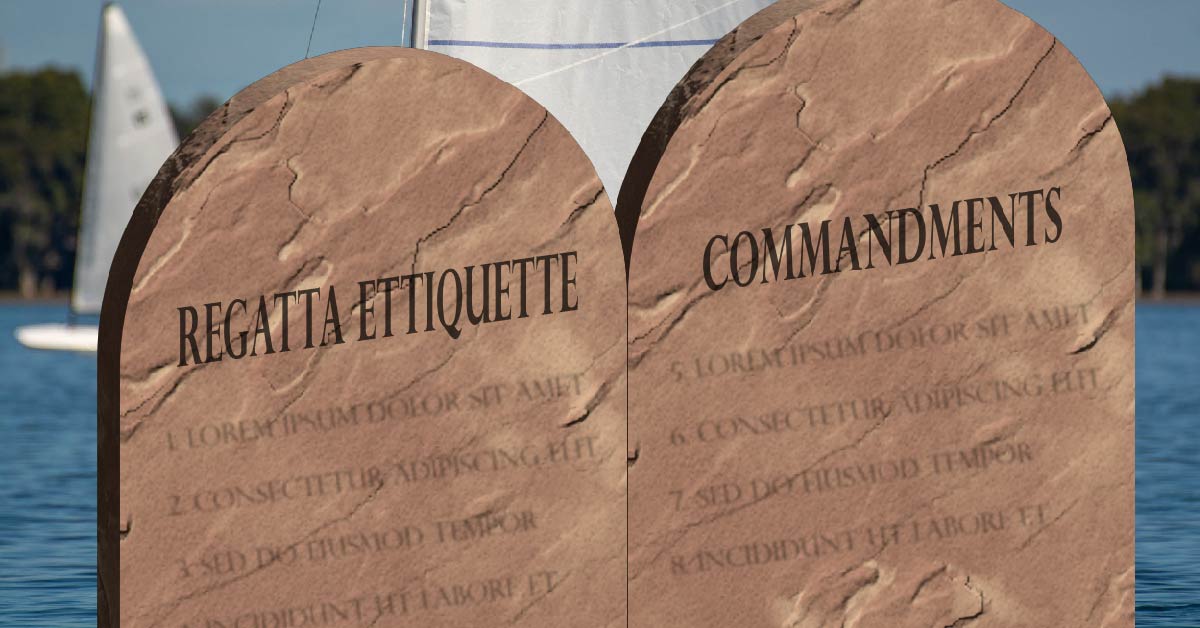What is regatta etiquette in sailing? An internet search might lead you to think it’s the fancy stuff – proper dress in the clubhouse, flag traditions, colors. Or it might imply following the racing rules. To others it might mean spectator boat and coach behavior on the water.
We were more interested in how the competitors conduct themselves throughout the regatta – both on and off the water. This led us to broaden the concept of regatta etiquette in the spirit of the Bible’s ten commandments. We couldn’t come up with ten, so you’ll have to settle for nine.
Our commandments were not handed down on stone tablets. The internet and our sailing library had little to say. Instead, we used our own experience about behaviors that make regattas a positive experience for everyone. Perhaps you’ll see a relationship between these and the “real” ten commandments.
Nine Commandments of Regatta Etiquette
#1. Say thanks
The organizers have worked hard and probably experienced a degree of stress and negativity. Your genuine, personal show of appreciation shows them their work was meaningful.
#2. Be a net giver
Some sailors come to the regatta unprepared and are constantly asking for help, spare parts, etc. Others don’t require much assistance but stick to themselves and don’t share much. It’s much better to engage with others, accepting help when needed, but giving more than you receive.
#3. Be positive, or least silent
Don’t judge yourself or others in a negative light. You may be unhappy with how you sailed, how the race was run, or what someone else did that affected you, but don’t wear that on your sleeve – it doesn’t help anyone.
#4. Don’t push rules and tactics when not necessary
Rules and tactics are essential to sailing, but so is the principle of “do unto others as you would have them do unto you.” Jonathan McKee writes about this in The Corinthian Conundrum in Sailing World.
#5. Follow instructions
Registration, launching/retrieval, traffic/parking are major challenges at any large regattas. If the regatta organizers have specified a plan, don’t try to gain an advantage by skirting it.
#7. Don’t cut
Everyone wants to launch and retrieve their boats quickly. Ideally, boats will get pulled out in roughly the order they reached the dock. You won’t make a lot of friends if you sail into an open spot ahead of other sailors already docked.
#6. Respect the property
Don’t litter. Clean up after yourself. If you damage something, fix it or offer to help. If you’re unsure about using club property, ask first.
#8. Avoid contact with other boats at the dock
Gelcoat is not known for its resilience. Don’t let your boat bang around at the dock.
#9. Honor your fellow competitors
OK, so you didn’t win a trophy. Why not stay for the presentation to honor those that did? If you must leave, congratulate them and other close competitors personally.
Related Content
Ten Commandments of Beer Can Racing – light-hearted list from Texas Sailing
Racing Rules of Sailing 2021-2024: What is Fair Sailing? – SailZing




Has anyone seen a Rule 2 protest for this: in a large fleet tightly congested at windward mark a port tacker forces his way in to avoid ducking twenty boats, breaks Rule 10 and 18, does a 720 and goes on his merry way. He just saved himself a ton of positions by deliberately fouling. I’ve never seen this called.
Thanks for the question. Maybe others know of examples, but I could not find any adjudicated cases of the situation you describe. However, I believe it would be judged a violation of Rule 2, since the rule was broken intentionally to gain an advantage.